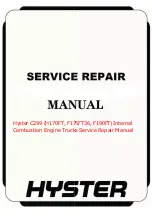
ENGLISH
2
FOREWORD
This manual explains the proper operation and maintenance of Toyota industrial vehicles as well as daily lubrica-
tion and periodic inspection procedures.
Please read this manual thoroughly even though you may already be familiar with other Toyota industrial vehicles
because it contains information which is exclusive to this series of vehicles. This manual is based on a standard
vehicle. If you have any questions about other types, please contact your Toyota industrial vehicle dealer (Toyota
dealer).
In addition to this manual, please be sure to read the separate publication entitled "Operator's Manual for
Safety Operation." Toyota reserves the right to make any changes or modifications of specifications in this
manual without giving previous notice and without incurring any obligation.
CONTENTS
Foreword ......................................................................................................................................................... 2 (En-1)
Contents ......................................................................................................................................................... 2 (En-1)
Before Initial Operation ................................................................................................................................. 2 (En-1)
Caution Plate .................................................................................................................................................. 5 (En-4)
Main Components .......................................................................................................................................... 6 (En-5)
Driving Controls and Instruments Panel ........................................................................................................ 6 (En-5)
General Screen ............................................................................................................................................... 7 (En-6)
Display ........................................................................................................................................................... 9 (En-8)
Screen Functions .......................................................................................................................................... 10 (En-9)
Optional Features ....................................................................................................................................... 13 (En-12)
Switches and Levers .................................................................................................................................. 19 (En-18)
Body Components ...................................................................................................................................... 24 (En-23)
Battery ........................................................................................................................................................ 27 (En-26)
Pre-operation Check ................................................................................................................................... 30 (En-29)
Weekly Maintenance .................................................................................................................................. 32 (En-31)
Self Servicing ............................................................................................................................................. 33 (En-32)
Periodic Maintenance ................................................................................................................................. 34 (En-33)
Periodic Replacement Table ....................................................................................................................... 34 (En-33)
Periodic Maintenance Table ....................................................................................................................... 34 (En-33)
Service Data ............................................................................................................................................... 37 (En-36)
Battery Case & Minimum Weight Required .............................................................................................. 38 (En-37)
Wheels & Tires (3W) ................................................................................................................................. 39 (En-38)
Wheels & Tires (4W) .................................................................................................................................. 39 (En-38)
Lubrication Chart (3W) .............................................................................................................................. 40 (En-39)
Lubrication Chart (4W) .............................................................................................................................. 41 (En-40)
Vehicle Dimensions ................................................................................................................................... 42 (En-41)
Frame Serial Number ................................................................................................................................. 43 (En-42)
How to Read the Name Plate ..................................................................................................................... 43 (En-42)
Mast Specifications and Rated Capacities ................................................................................................. 44 (En-43)
BEFORE INITIAL OPERATION
•
Please read this manual thoroughly.
This will
give you a complete understanding of Toyota
industrial vehicles and enable you to operate them
correctly and safely. Proper handling of new vehi-
cles promotes performance and extends life. Drive
with special caution while becoming familiar with
a new vehicle. In addition to the standard operating
procedures, pay attention to the following safety
items.
•
Please acquire a thorough knowledge of the
Toyota industrial vehicle.
Read the operator's
manual thoroughly prior to operating the vehicle.
Get to know its operation and components. Learn
about the safety devices and accessory equipment
and their limits and precautions. Be sure to read the
caution plate attached to the vehicle.
•
Please familiarize yourself with safe driving
techniques and safety management.
Understand
and maintain work area traffic rules. Ask the work
area supervisor about any special working pre-
cautions.
•
Wear neat clothing for operation.
Improper clo-
thing for vehicle operation may interfere with
smooth operation and cause an accident. Always
wear proper clothing for easy operation.
•
Avoid electric power lines.
Know the locations of
inside and outside power lines and maintain suffi-
cient distance.
•
Be sure to perform pre-operation checks and
periodic maintenance.
This will prevent sudden
malfunctions, improve work efficiency, reduce
costs, and help ensure safe working conditions.
•
Be sure to avoid forward tilt when the loaded
forks are raised.
In the worst case, this will cause
overturning due to poor stability resulting from
forward shifting of the center of gravity.
•
If you hear any abnormal noises or sense
anything unusual, inspect and repair immedia-
tely
•
Never attempt traveling with a load on the forks
lifted beyond the specified height.
Traveling with
a load on the forks lifted beyond the specified
height may cause overturning due to upward shif-
ting of the center of gravity. Keep the forks at 15-
20 cm (5.9 -7.9 in.) above the ground when trave-
ling.
•
Avoid overloading or uneven loading.
Over-
loading or uneven loading is dangerous. If the cen-
ter of gravity is closest to the front side even
though the load is below the maximum, limit the
loading weight according to the name plate.
•
Avoid reckless operation.
•
Use only the recommended lubricants.
Low-
grade lubricants will shorten service life.
•
Do not overdischarge.
Always check the condi-
tion of the battery.
•
Avoid open flames during charging.
Combustible
gas is produced during charging. Charge away
from open flames in a well- ventilated place.
•
Cold Storage Models.
A cold storage model
option is not available. Do not perform operations
in a cold storage.
•
Do not make any alterations to the electrical sys-
tem.
Any attempt to do so may affect the operation
of the precision devices built into the battery-ope-
rated forklift, causing a malfunction or accident.
If any alterations become necessary, contact a
Toyota dealer.
•
When washing the forklift, be careful not to
splash the motor or electrical parts directly with
water.
If the motor or electrical parts are directly
splashed with water, the forklift may malfunction
or break down. If it becomes unavoidable to wash
the battery-operated forklift, carefully cover elec-
trical parts with a vinyl sheet or the like to protect
them from getting wet.
•
Return to neutral mechanism.
If the key switch
or the seat switch is turned ON with the direction
lever set to the forward or reverse position or the
accelerator pedal depressed, the vehicle does not
travel unless the direction lever and accelerator
pedal are returned to the neutral positions.
•
For vehicles that are equipped with non-marked or
color tires, be sure to install a static strap.
Cautions for thunder
•
If thunder can be heard in the distance, stop char-
ging the battery and disconnect the charging plug.
•
If thunder can be heard close by, do not touch the
power supply plug or cord because you may
receive an electric shock if lightning strikes close
by.
•
Setup of a lightning rod or a lightning arrester in
the electric circuit is strongly recommended in
areas where thunder is frequently heard.
(En-1)
Summary of Contents for 8FBE18T
Page 1: ......
Page 53: ...53 En En 52...
























